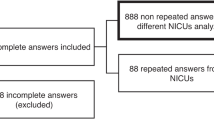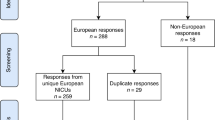Abstract
Objective:
To assess Dutch pediatricians’ views on neuromuscular blockers for dying neonates.
Study design:
Qualitative study involving in-depth interviews with 10 Dutch pediatricians working with severely ill neonates. Data were analyzed using appropriate qualitative research techniques.
Result:
Participants explained their view on neuromuscular blockers for neonates with a protracted dying process. Major themes were the interpretation of gasping, the role of (the suffering of) the parents, the need for judicial review and legislation’s impact on the care participants provide for dying neonates.
Conclusion:
The interviews show no consensus between pediatricians and provide insights into the points of disagreement. Interviews also suggest friction between the convictions of pediatricians and legislation, which seems to have an undesirable impact on Dutch care for dying neonates and their parents. This study raises important questions for pediatricians worldwide to reflect upon, such as: ‘what constitutes ‘dying well’?’ and ‘what role should the parents’ perspective play?’.
This is a preview of subscription content, access via your institution
Access options
Subscribe to this journal
Receive 12 print issues and online access
$259.00 per year
only $21.58 per issue
Buy this article
- Purchase on Springer Link
- Instant access to full article PDF
Prices may be subject to local taxes which are calculated during checkout

Similar content being viewed by others
References
[Legal provision central expert committee on late termination of pregnancy (category 2) and deliberately ending the life of a neonate]. Staatscourant. 2007; 51: 8.
Expert committee on late termination of pregnancy and deliberately ending the life of a neonate, [Annual report years 2009-2010]. 2011.
Buiting HM, Karelse MA, Brouwers HA, Onwuteaka-Philipsen BD, van der Heide A, van Delden JJ . Dutch experience of monitoring active ending of life for newborns. J Med Ethics 2010; 36 (4): 234–237.
Versluys C [To treat or not to treat, boundaries of medical practice in neonatology]. Utrecht: [Pediatric association of The Netherlands];, 1992.
Committee Acceptability Ending Life of the Royal Dutch Medical Association [Medical practice at the end of life in incompetent patients: newborns with severe impairments]. Bohn Stafleu Van Loghum: Houten, 1997.
Committee Review Careful Medical Practice at the End of Life. Review as Mirror of Medical Practice. Ministry of Health Welfare and Sports: Rijswijk, The Netherlands, 1997.
Committee Ethical Aspects of Neonatology. [Guidelines for end of life decisions in neonatology]. Utrecht: [Pediatric association of The Netherlands]; 2000.
Verhagen AA, Sol JJ, Brouwer OF, Sauer PJ . [Deliberate termination of life in newborns in The Netherlands; review of all 22 reported cases between 1997 and 2004]. Ned Tijdschr Geneeskd 2005; 149 (4): 183–188.
van der Heide A, van der Maas PJ, van der Wal G, de Graaff CL, Kester JG, Kollee LA et al. Medical end-of-life decisions made for neonates and infants in the Netherlands. Lancet 1997; 350 (9073): 251–255.
Verhagen E, Sauer PJ . The Groningen protocol—euthanasia in severely ill newborns. N Engl J Med 2005; 352 (10): 959–962.
Moratti S . Ethical and legal acceptability of the use of neuromuscular blockers (NMBs) in connection with abstention decisions in Dutch NICUs: interviews with neonatologists. J Med Ethics 2011; 37 (1): 29–33.
[Medical decisions at the end of life in neonates with severe impairments]. Utrecht: [The Royal Dutch Medical Association]; 2013.
Verhagen AA, Dorscheidt JH, Engels B, Hubben JH, Sauer PJ . Analgesics, sedatives and neuromuscular blockers as part of end-of-life decisions in Dutch NICUs. Arch Dis Child Fetal Neonatal Ed 2009; 94 (6): F434–F438.
Janvier A, Meadow W, Leuthner SR, Andrews B, Lagatta J, Bos A et al. Whom are we comforting? An analysis of comfort medications delivered to dying neonates. J Pediatr 2011; 159 (2): 206–210.
Greenhalgh T, Taylor R . Papers that go beyond numbers (qualitative research). BMJ 1997; 315 (7110): 740–743.
Boeije H . [Analyzing in qualitative research]. Boom Onderwijs: Amsterdam, 2005.
Perkin RM, Resnik DB . The agony of agonal respiration: is the last gasp necessary? J Med Ethics 2002; 28 (3): 164–169.
Kuhse H . Response to Ronald M Perkin and David B Resnik: the agony of trying to match sanctity of life and patient-centred medical care. J Med Ethics 2002; 28 (4): 270–272.
Dorscheidt JH, Verhagen E, Sauer PJ, Hubben JH . Medication regimes in the context of end-of-life decisions in neonatology: legal considerations with regard to Dutch NICU-practice. Med Law 2013; 32 (2): 215–229.
Hawryluck L . Neuromuscular blockers—a means of palliation? J Med Ethics 2002; 28 (3): 170–172.
Daubin C, Haddad L, Folscheid D, Boyer A, Chalumeau-Lemoine L, Guisset O et al. Ethical reflections on end-of-life signs and symptoms in the intensive care setting: a place for neuromuscular blockers? Ann Intensive Care 2014; 4: 23.
Moro T, Kavanaugh K, Okuno-Jones S, Vankleef JA . Neonatal end-of-life care: a review of the research literature. J Perinat Neonatal Nurs 2006; 20 (3): 262–273.
McHaffie HE, Lyon AJ, Fowlie PW . Lingering death after treatment withdrawal in the neonatal intensive care unit. Arch Dis Child Fetal Neonatal Ed 2001; 85 (1): F8–f12.
Griffiths J, Bood A, Weijers H . Euthanasia and Law in the Netherlands. Amsterdam University Press: Amsterdam, The Netherlands, 1998.
Acknowledgements
We thank all the interviewed pediatricians for their participation in this study. We especially appreciate the sincerity and openness with which they talked to us about this sensitive aspect of their work. We also want to thank the other members of our research team who participated in the evaluation of the ‘legal provision for late termination of pregnancy and deliberately ending the life of a neonate’: Ineke Bolt (PhD) from the Medical Ethics and Philosophy department of the Erasmus Medical Center Rotterdam, who conducted some interviews and helped with the analysis of data, Agnes van der Heide (MD, PhD, Professor) from the department of Public Health of the Erasmus Medical Center Rotterdam, who, as project leader, advised us on several issues during the project and also gave commentary on a draft version of this article and Sjef Gevers (LL.M, PhD, Professor) from the department of Public Health of the Academic Medical Center Amsterdam who was concerned with the legal themes of the project. Eduard Verhagen (MD, PhD, Professor) from the University Medical Center Groningen is acknowledged for his advice on the project and his commentary on a draft version of this article. Finally, we thank ZonMw and NVVE who funded this research. Data collection was funded by ZonMw (The Netherlands Organization for Health Research and Development). KtC wrote the first draft of this article during an appointment at the Academic Medical Center Amsterdam. This appointment was funded by the NVVE (right-to-die-NL). Both ZonMw and NVVE had no role in the design, the collection, analysis and interpretation of the data, the reporting of this work, or the decision to submit the work for publication.
Author information
Authors and Affiliations
Corresponding author
Ethics declarations
Competing interests
The authors declare no conflicts of interest.
Rights and permissions
About this article
Cite this article
ten Cate, K., van de Vathorst, S. Dutch pediatricians’ views on the use of neuromuscular blockers for dying neonates: a qualitative study. J Perinatol 35, 497–502 (2015). https://doi.org/10.1038/jp.2014.238
Received:
Accepted:
Published:
Issue Date:
DOI: https://doi.org/10.1038/jp.2014.238



